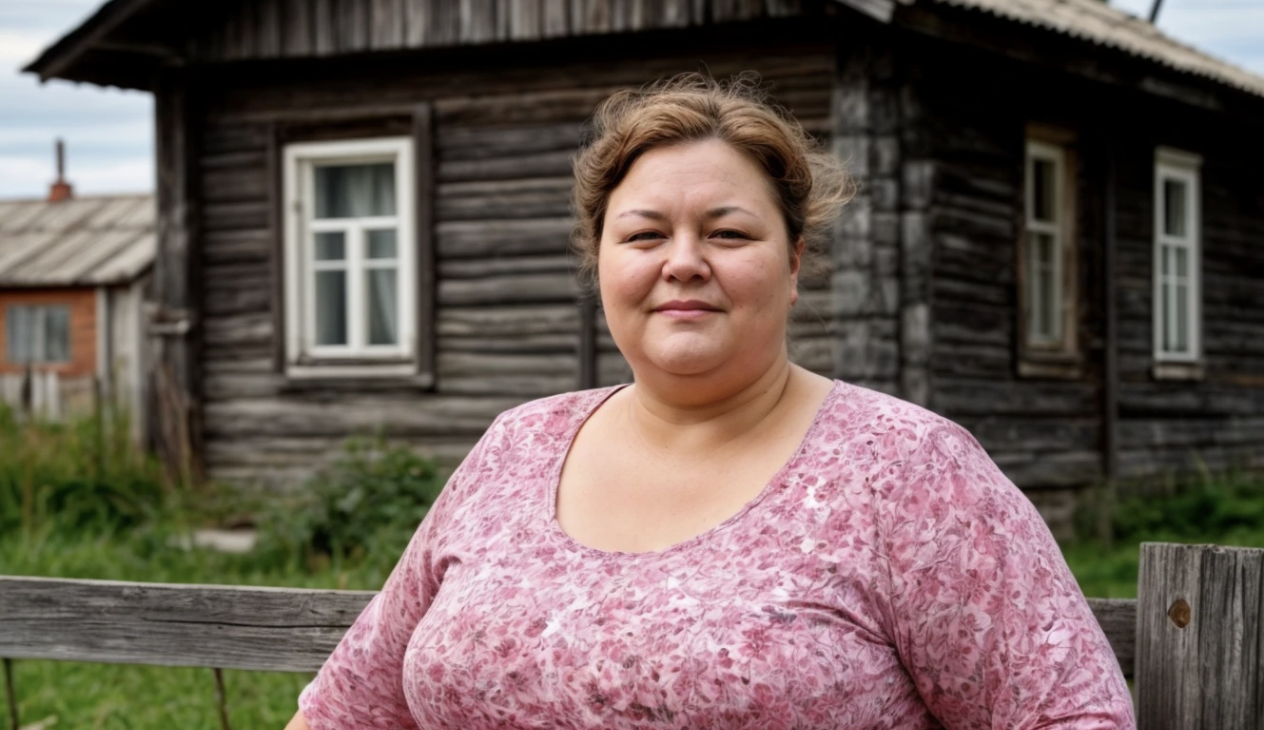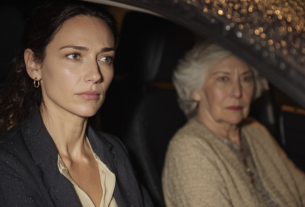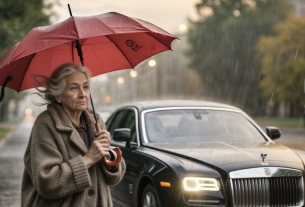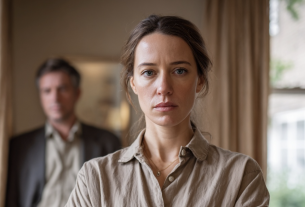The city below roared like the ocean — muffled, indistinct, far away somewhere. But here, on the bridge, there was an icy silence broken only by the splash of water against the concrete pillars of the dam. Anna gripped the cold railing tightly and looked down. The dark, almost black water called to her, as if promising an easy and quick way out. One step, one moment of falling — and that’s it: no pain, no humiliation, no exhausting feeling of being utterly useless.
“How simple,” the thought spun in her mind. “It can all end in a second.” Inside, there was emptiness — scorched by fatigue, fear, and the bitterness of disappointment. Trust, hope, faith in people and meaning had long evaporated, leaving only the ashes of despair. She felt helpless, unwanted by anyone, like an old thing thrown away to the dump.
Her lips whispered something indistinct — not a prayer, no, she never truly knew how to pray. Just a soundless, desperate murmur, an attempt to cling to the last memories of warmth and trust. But memory brought a completely different picture.
Night. Bedroom. His voice — cruel, cutting, as if without a knife:
“You’re a cow. Stupid. Like a kettle — just heating up and standing there. I don’t need you.”
Every word struck like a blow, forcing her down, shrinking her, robbing her dignity. Anna physically felt herself shrinking under his contemptuous gaze.
Then — the frantic packing. Ten minutes to throw underwear, documents, a toothbrush into an old bag. The door slammed — and that was it, no way back. The street. Cold, indifferent. He had long driven away her friends with his jealousy and suspicion. Her mother died a couple of years ago, and her apartment — the only thing she truly owned — was taken away for his “expansion” — for his convenience. Now there was nowhere to go. Only emptiness — absolute, ringing.
Another episode flashed — recent and especially painful. His mistress. Young, bold, confident predator. She came in like the mistress of the house, sat down in the armchair, cast a mocking glance.
“Well, grandma at the samovar, how long will you be smoking here?”
She mocked, was rude, practically pushed Anna out the door. Anna tried to respond, but the words stuck in her throat like a lump. She only felt again her insignificance, her weakness before someone else’s brazenness.
And now — the bridge. The railing. And that almost irresistible urge to take a step. Despair reached its limit, flooding her mind, depriving her of the strength to resist.
She had already thrown one leg over the barrier when suddenly the screech of brakes and bright headlights lit up the night. A car screeched to a halt nearby, nearly hitting the guardrail. Startled, Anna jumped back.
A tall man got out of the car. Without a word, he decisively approached and grabbed her hand. His grip was iron.
“What are you doing, crazy woman?!” His voice was rough, but there was no malice in it — rather anxiety and… strange care.
He literally pushed her into the car, not giving her time to recover. Confused, Anna let herself be seated. The car smelled of leather and male cologne. She curled up in the seat and began to cry. Tears flowed in an endless stream, smudging mascara across her face, mixing with road dust. He was silent, only tightly gripping the steering wheel and looking ahead.
When the first sobs began to subside, he said without turning his head:
“Cry. Let it all out. It will help.”
Then he added softer, though still somewhat harshly:
“To end your life because of a man? Where’s your mind? You have one life. And there will be many men. And no one will give you a new life. Without life, these torments and insults wouldn’t exist at all. Understand?”
His words were simple, but there was sincerity and some deep meaning in them. Something in his voice, in this unexpected support, awakened a cooled feeling in Anna. Tears still flowed, but it became easier to breathe. It seemed the darkness that weighed on her day after day was leaving along with them.
The car turned off the busy highway onto a quiet country road and soon stopped by a tall wrought-iron fence. Behind it was a large house with a dark roof and bright windows. Leaves of different shades slowly swirled in the autumn wind in the yard.
A woman came out of the house — short, plump, with kind, slightly squinting eyes. The man (his name was Viktor) quietly said something to her, and she addressed Anna:
“Hello, dear. I’m Maria. Come inside, you’ll catch a cold.”
Her voice was soft, like warm milk, and for the first time in a long time, Anna felt warmth. She obediently followed.
The house greeted her with coziness and the smell of baking. Maria seated her at the wooden kitchen table and brewed tea. The first sip was hot but so alive. After the night’s cold and fear, this drink seemed the best in life. She still felt lost, but the kindness of this woman and the atmosphere of the home slowly warmed her frozen soul.
Soon Viktor returned with her bag.
“Here, scatterbrain,” Maria smiled, taking the things. “It’s okay, everything was found. Drink tea, dear. Everything will be fine.”
In the evening, they gathered again at the kitchen table. Viktor poured tea. He was taciturn, but his questions were direct, and Anna wanted to answer. Unexpectedly, she began to talk — at first confused, with pauses and tears, then more freely. The past poured out: humiliation, betrayal, loneliness, thoughts of suicide. She spoke, jumping from one topic to another, but Viktor and Maria listened attentively without interrupting.
When Anna fell silent, exhausted and a little embarrassed by her openness, Viktor looked at her with a long, serious gaze.
“My doctor told me recently that I have little time left,” he said quietly. “The illness is serious. But I’m fighting. While I’m alive, I’ll live. Clinging to each day is important.”
Anna froze. His words, his calm readiness to resist shocked her. Against his situation, her pain seemed trivial.
Maria gently stroked her hand.
“He once pulled me out of the abyss. My husband beat me, drank, didn’t let me live. But Viktor helped. Now I try to repay him with kindness.”
Anna sat stunned. For the first time in a long while, she was listened to not with pity, but understanding. And for the first time, a timid but real hope awakened in her chest. Maybe all was not lost yet?
In the morning, Viktor asked her to help with paperwork.
“Since you’re here — don’t sit idle. Maybe it’ll be useful,” he said with his usual gruffness, but with cheerful sparks in his eyes. Anna blushed, feeling worthless again, but nodded. She really had nothing more to lose.
While sorting documents, Viktor casually asked Anna about her past. Learning she graduated from an economics faculty and worked several years as a manager in a small company, he snorted.
“Take a look at this,” he handed her a folder of papers. It turned out to be about a network of mini gas stations he owned. “I don’t have time now, but something tells me: it’s not all clean there. That director is too cunning. Look, figure it out, okay? I can’t deal with it myself — health failing.”
Anna was at first confused — suddenly addressed so trustingly. But something awakened inside. A forgotten feeling of interest, professional excitement. She enthusiastically took on the task. Days passed sitting in the office at one of the stations, studying reports, reviewing documents, asking employees questions.
Within weeks, her suspicions were confirmed: the director was indeed stealing, taking advantage of the owner’s illness. Anna gathered all evidence and showed it to Viktor. He only nodded grimly:
“I thought so. So now you’re the boss here. Deal with it yourself.”
Over time, Anna fully immersed herself in work. She fired the dishonest director, hired new employees, restored the accounting system. The gas stations, which barely broke even before, began making a profit. Maria supported Anna in every way, rejoiced at her successes like a mother.
“Well, you’re our star,” she told Viktor. “And you doubted her.”
Anna began to like herself — organized, businesslike, confident. She noticed how she stood straighter, how her gaze grew firmer. The old timidity, fear of rejection disappeared. She was proud of herself, her actions, her ability to handle even the most difficult.
One evening, Viktor’s health sharply worsened. The illness, which seemed to have retreated a bit, now returned with renewed force. He was urgently hospitalized. Maria cried openly, Anna rushed about the house, restless. For the first time in many years, she truly feared losing a loved one. These two had become her family.
At night, when Maria calmed down and fell asleep, Anna sat beside Viktor in the hospital room. He was pale, weak, but in his eyes still flickered a familiar spark.
“Well, Anna Nikolaevna…” he spoke for the first time so formally. “Looks like my days are numbered. Time to prepare for parting.”
He spoke slowly, with effort, but every word reached the heart. He shared regrets, spoke about what he hadn’t done, about people he hadn’t forgiven. And thanked Anna for coming into his life, filling it with new meaning.
Anna listened, tears streaming down her face. She did not try to hold them back. When he fell silent, exhausted, she leaned over and hugged him tightly.
“I won’t go anywhere,” she whispered. “We’ll fight.”
And she really fought. During the day, she managed the business, solved problems at the gas stations, resolved conflicts. In the evenings, she was at the hospital with Viktor. Supported Maria, helped her with the household. For the first time in her life, she felt needed, strong, responsible not only for herself but for others. It was a new, almost intoxicating feeling.
One day, while checking one of the gas stations, Anna came face to face with the past. Sergey — her ex-husband — came to the cash register. Next to him, clutching his hand, was Kristina — his new mistress.
At first Sergey didn’t recognize her. He just glanced briefly and looked away. Then suddenly froze. His gaze flickered with confusion, then shock. He realized who was in front of him. Not the beaten-down woman he remembered. Now she was a slender, well-groomed, confident woman in stylish clothes, with a firm, calm gaze.
Kristina also stared at Anna — envy and irritation flickered in her eyes. She hissed something unpleasant to Sergey.
“Anna Nikolaevna, one of the suppliers is asking for you,” an employee approached her.
“Anna Nikolaevna?” Sergey repeated, stunned. “The cashier?”
The employee only shrugged:
“That’s her gas station.”
Sergey’s face twisted. He was not just surprised — he was humiliated. Without extra words, he led Kristina away, ignoring her indignant muttering.
Anna watched them leave. Strangely, there was no anger or pain — only quiet satisfaction, as if an old bleeding wound was healing. This person no longer had power over her.
A few weeks later, Viktor returned home — thin, weak, but with the same lively sparkle in his eyes. Anna met him at the door. He looked at her for a long time, then hugged.
“Thank you, Anechka,” he whispered. “For everything. You didn’t just save my business — you gave me a second life.”
A couple of days later, when strength somewhat returned, an important conversation took place. They sat in the living room while Maria fussed in the kitchen.
“Anya,” Viktor began, his voice trembling. “I’ve decided… You’re now more precious to me than anyone. Marry me.”
Anna looked at him, tears again filling her eyes. But now these were tears of happiness. She nodded — without words, but with full confidence in her heart.
Their life went on its way — calm, harmonious. The business developed, Viktor slowly recovered, and Maria, watching them, only smiled.
“The Lord himself sent us Anya,” she said. “Rewarded us for patience.”
Anna often remembered that night on the bridge. That despair, that weakness. And gratefully thought about fate, about Viktor, about the coincidence that linked their paths. She was no longer a victim. She had become a woman who found her purpose, love, and strength to live on.
“Value your life,” she wanted to tell everyone who loses hope. “Don’t give up! Even if it seems there’s no way out, believe — everything can change in the most unexpected way. The main thing is to take a step toward the light.”
In the evening, they sat at the large wooden kitchen table, drinking tea. Maria told a funny story from her youth, Viktor teased her, Anna laughed with them. The house was filled with warmth, care, and love. It was true, hard-won happiness — happiness that comes after trials and becomes especially precious.



